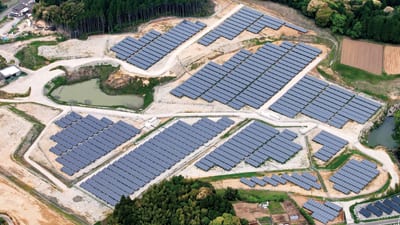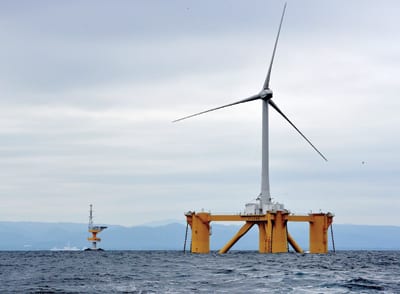The Japanese Government issued an energy outlook in July 2015 projecting Japan’s future energy mix in the wake of the March 2011 nuclear power plant accident. This policy proposal presents five perspectives that will be essential in making the government’s energy outlook substantive and realistic
In July 2015, the Ministry of Economy, Trade, and Industry approved a Long-Term Energy Supply and Demand Outlook indicating the future composition of Japan’s energy mix in the wake of the March 2011 Fukushima nuclear power plant disaster. This outlook is an important guideline for Japan’s energy policy in such areas as a strategy for the procurement of resources from overseas, plans for energy supply and demand, and plans for domestic energy infrastructure construction.
Similar roadmaps have been presented for Japan’s energy mix in the past. For example, in June 2012, the government released a document titled “Options for Energy and the Environment,” which presented three scenarios for future energy use. The breakdowns by type of energy source have tended to be unrealistic, however, consisting of percentages calculated on the basis of such theoretical factors as energy potential, power generation efficiency, and generating capacity—without sufficient consideration of the actual issues relating to the use of each power source and relevant global conditions.

The 2015 outlook, too, appears divorced from reality, as coalfired thermal power, which is projected to decline in the period up to 2030, has instead continued to rise in response to the liberalization of the retail electric power market in April 2016. The global energy picture has been changing rapidly as well; since the adoption of the 2015 outlook, oil prices have taken a record plunge, and a global shift in energy use could accelerate with the adoption of the Paris Treaty by all the participating countries at the 2015 UN Climate Change Conference (COP 21). These and other developments are sure to affect Japan’s energy mix.
The 2015 outlook will lose its relevance in shaping Japan’s energy mix unless close attention is paid to both domestic conditions and international trends. The following five perspectives will be essential in making the government’s energy mix outlook substantive and realistic.
KEEP ABREAST OF THE GLOBAL ENERGY SHIFT
Over the years since the March 2011 nuclear accident, Japan has been scrambling to rebuild its energy policy, but the global energy situation has undergone substantial changes in the interim. In December 2014 the price of oil dropped below $60 a barrel for the first time since 2009, and in February 2016 it plunged to less than $30—the lowest since 2003.
In December 2015, meanwhile, the countries participating in COP 21 adopted the Paris Agreement by consensus, setting forth their intention to head for an energy shift by promoting a full-scale move away from fossil fuels and expanded use of clean energy regardless of the price of crude oil.
The retail market for electricity in Japan was deregulated in April 2016. Previously, power company’s rates were set on a cost-plus basis, and each company held a monopoly on the retail market for electricity in its region, but now transactions in the market have been liberalized
Through this energy shift, countries are aiming to improve their competitive positions by investing in clean energy sources and seeking to establish technologies and reduce costs, while also building up their clean energy industries. The clean energy sector is expected to grow to a scale comparable to that of the global auto industry, and Japan cannot let itself fall behind in this field.
Japan has the technological progress to lead the clean energy sector. In order to tap this know-how and become a major player in this sector, greater use of clean energy must be promoted domestically so as to build up a home market for the industry. This is another reason for Japan to keep abreast of developments in the global energy shift and to reflect such trends in its energy mix.
IMPACT OF THE UNPRECEDENTED CHANGES
The retail market for electricity in Japan was deregulated in April 2016. Previously, power company’s rates were set on a cost-plus basis, and each company held a monopoly on the retail market for electricity in its region, but now transactions in the market have been liberalized. In the deregulated wholesale market, electricity with low marginal costs will be consumed first, and so the idea of deliberately packaging electricity categorized as baseload power, mid-range load power, and peak load power—as has been done up to now—no longer makes much sense.
Energy is a major concern for a broad range of fields, including economic activity, technological development, environmental protection, national security, land use, and regional development. Formulating an energy mix thus requires close coordination among the relevant government ministries and agencies
In Europe, a pioneer in electricity market deregulation, the use of renewable energy with zero marginal cost was promoted, pushing unprofitable nuclear power and thermal power out of the market. In Japan, there have been moves to build new coal-fired power plants, whose generating costs are lower than those for liquefied natural gas. Market deregulation will have a major impact on the power mix, and this should be fully considered.
SET SHARES FOR DIFFERENT POWER SOURCES
Each power source has its advantages and disadvantages, so simply ranking one over another is not possible.

Also, there are issues in the use of each power source, and we must consider the prospects for and difficulties in resolving those issues in setting energy mix targets. An energy mix containing sources with problems for which no solution is in sight will not be realistic.
An energy mix blueprint should present not just the shares of each power source but also the concrete steps, including a timetable, for solving the issues relating to each source.
DO NOT RIGIDLY FIX THE ENERGY MIX BUT REVISE IT FLEXIBLY
The energy mix is generally formulated from a medium- to long-term viewpoint, but conditions change on a daily basis. Japan needs to keep a watch on the progress toward resolving the issues for each power source and respond accordingly. To have the energy mix reflect actual conditions, including progress toward the resolution of issues, it should not be set rigidly but be subject to flexible revision.
CREATE A PLATFORM FOR GREATER COLLABORATION AMONG GOVERNMENT MINISTRIES
Energy is a major concern for a broad range of fields, including economic activity, technological development, environmental protection, national security, land use, and regional development. Formulating an energy mix thus requires close coordination among the relevant government ministries and agencies.